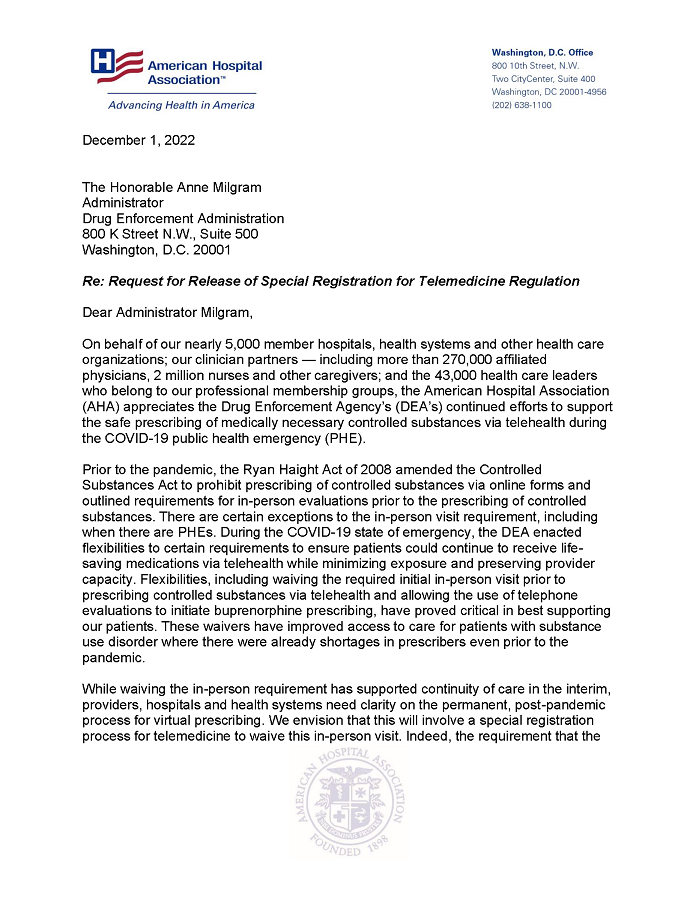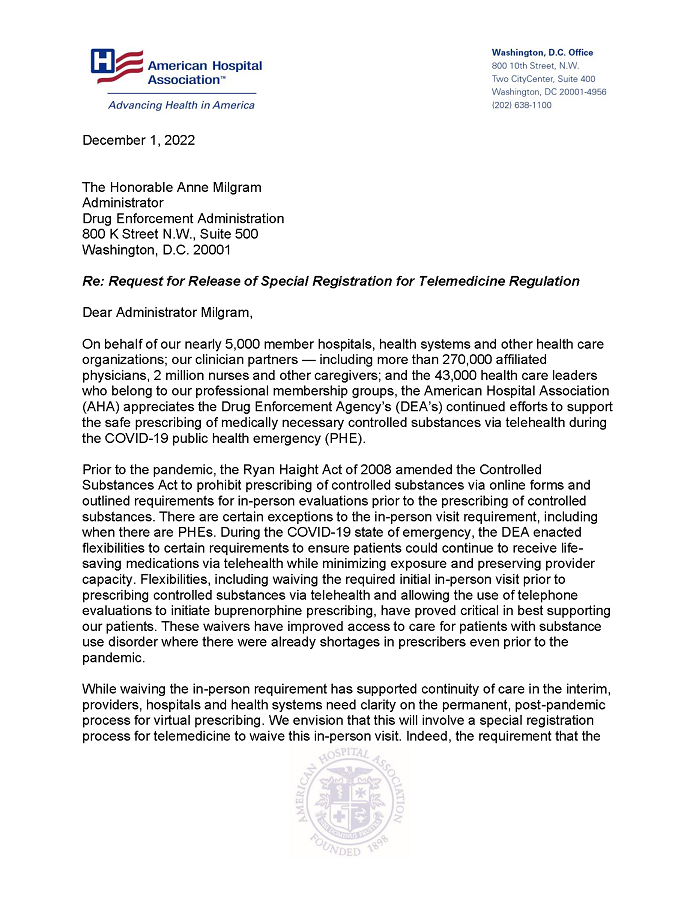

AHA Letter to DEA Regarding Request for Release of Special Registration for Telemedicine Regulation
December 1, 2022
The Honorable Anne Milgram
Administrator
Drug Enforcement Administration
800 K Street N.W., Suite 500
Washington, D.C. 20001
Re: Request for Release of Special Registration for Telemedicine Regulation
Dear Administrator Milgram,
On behalf of our nearly 5,000 member hospitals, health systems and other health care organizations; our clinician partners — including more than 270,000 affiliated physicians, 2 million nurses and other caregivers; and the 43,000 health care leaders who belong to our professional membership groups, the American Hospital Association (AHA) appreciates the Drug Enforcement Agency’s (DEA’s) continued efforts to support the safe prescribing of medically necessary controlled substances via telehealth during the COVID-19 public health emergency (PHE).
Prior to the pandemic, the Ryan Haight Act of 2008 amended the Controlled Substances Act to prohibit prescribing of controlled substances via online forms and outlined requirements for in-person evaluations prior to the prescribing of controlled substances. There are certain exceptions to the in-person visit requirement, including when there are PHEs. During the COVID-19 state of emergency, the DEA enacted flexibilities to certain requirements to ensure patients could continue to receive life-saving medications via telehealth while minimizing exposure and preserving provider capacity. Flexibilities, including waiving the required initial in-person visit prior to prescribing controlled substances via telehealth and allowing the use of telephone evaluations to initiate buprenorphine prescribing, have proved critical in best supporting our patients. These waivers have improved access to care for patients with substance use disorder where there were already shortages in prescribers even prior to the pandemic.
While waiving the in-person requirement has supported continuity of care in the interim, providers, hospitals and health systems need clarity on the permanent, post-pandemic process for virtual prescribing. We envision that this will involve a special registration process for telemedicine to waive this in-person visit. Indeed, the requirement that the agencies issue a regulation outlining the special registration process for telemedicine was first established nearly 14 years ago in the Ryan Haight Act and was re-enforced over three years ago in the SUPPORT Act. During this time, providers have waited patiently for guidance. However, there is growing concern that the pending expiration of the COVID-19 PHE and its associated waivers, combined with the lack of a special registration regulation, will leave providers in a position where they will need to cut services and leave patients without access to necessary treatment. With the expiration of the COVID-19 PHE currently scheduled for next year, this situation could come to pass as early as mid-January.
Therefore, we urge the DEA to release proposed rules for the Special Registration for Telemedicine as soon as possible. Doing so is necessary to ensure an appropriate feedback period and time for hospitals and health systems to comply with requirements. Considering unprecedented staffing shortages, provider burnout and financial constraints, it is critical that hospitals have adequate time to reallocate resources to operationalize regulation components.
In addition, we also urge the DEA to provide an interim plan to support continuity of care for the period between the expiration of the COVID-19 PHE and implementation of the Special Registration for Telemedicine final rules if there is a gap period. Specifically, we would suggest components of the interim plan include policies such as:
- Waiving the in-person requirement and continuing flexibilities for telephone evaluations to initiate buprenorphine prescribing. Given concerns regarding the expiration of the COVID-19 PHE, we would recommend transitioning this waiver for Substance Use Disorder under the Opioid Epidemic PHE which does not have an anticipated end date;
- Providing a solution for patients engaged in an episode of care where the episode was initiated via telemedicine prior to the end of the COVID-19 PHE. Current waivers do not address how the in-person requirement will be addressed at the end of the COVID-19 PHE for open episodes, so we recommend extending the waiver for an in-person exam for the duration of the episode; and
- Providing a solution for patients who initiate an episode of care between the expiration of the COVID-19 PHE and publication of the final rule for Special Registration for Telemedicine. Again, current waivers do not address how the in-person requirements will be addressed for episodes initiated in the gap period where the COVID-19 PHE expires and the final rule is published, so we recommend extending the waiver for an in-person exam for the duration of the episode.
Given the continued workforce challenges of today, we also urge the DEA to grant permanent exception for practitioners in states that have medical licensing reciprocity requirements to file separate DEA registration in any state a provider practices under the reciprocity arrangement to ensure appropriate prescribing for patients through telehealth services.
We thank you for considering our request. If you have any questions concerning our comments, please feel free to contact me, or have a member of your team contact Jennifer Holloman, AHA’s senior associate director of policy, at jholloman@aha.org.
Sincerely,
/s/
Stacey Hughes
Executive Vice President
Government Relations and Public Policy


